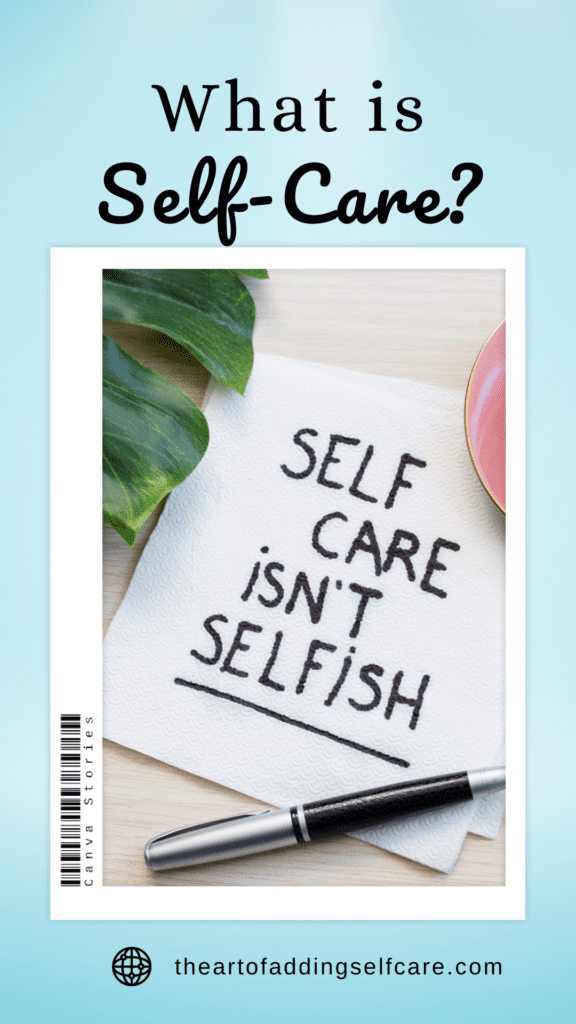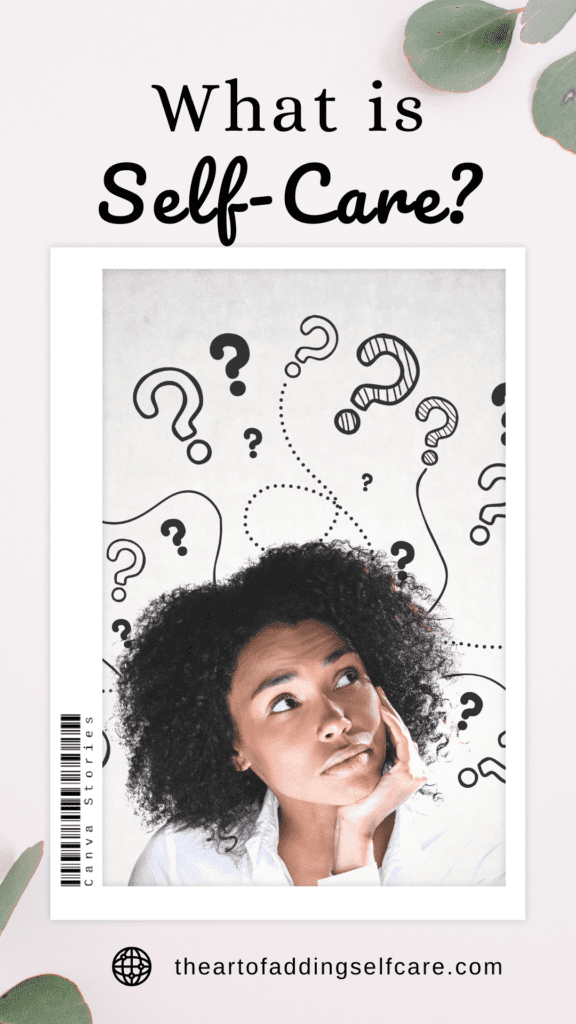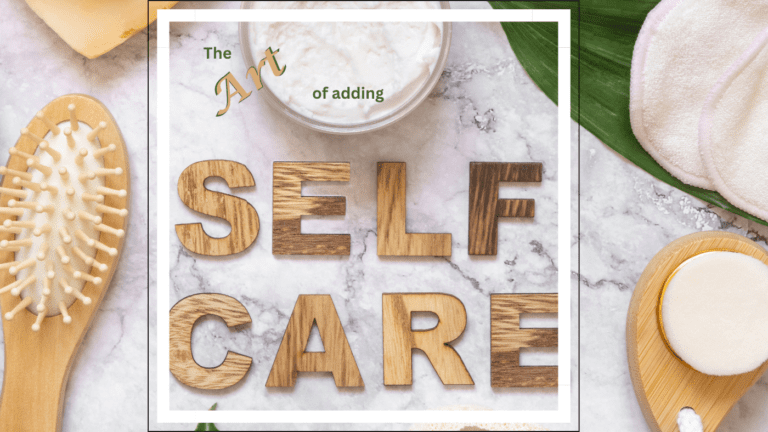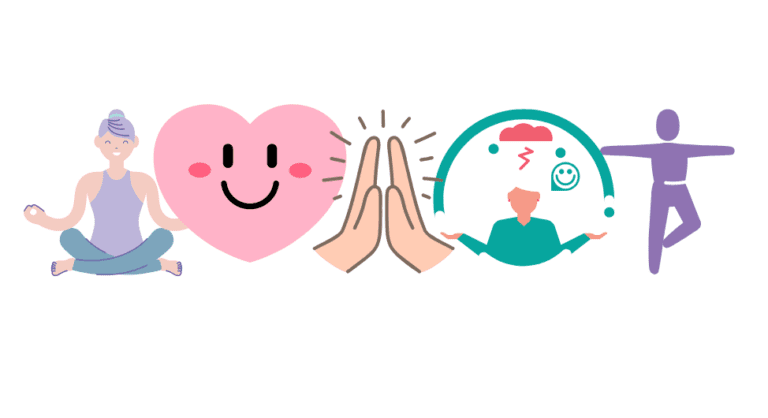1 Powerful answer to “What is Self-Care?”
Self-care is something most people ignore. Many people even ask themselve, “What is self-care?” The true essence of self-care is having enough in our cup to be able to take care of others. In this post, we will shatter common misconceptions and reveal the transformative power of your unique self-care needs. From our physical and emotional well-being to our mental and spiritual growth, self-care is the cornerstone of living a balanced, healthy, and fulfilling life with less stress and higher quality of life. So, let’s embark on this path together, uncovering the various facets of self-care and discovering practical ways to nurture ourselves in today’s fast-paced world.
Self-care has been practiced since ancient civilizations, where the idea of maintaining personal health and well-being through self-care activities was considered essential. Greek philosophers like Socrates and Hippocrates emphasized the importance of self-care as a means to achieve a harmonious and balanced life. Fast forward to the modern era, the development and importance of self-care in psychological and medical fields have gained significant traction. The World Health Organization (WHO) recognizes self-care as an integral part of overall health, emphasizing its role in preventing illness and managing chronic conditions.
In the psychological realm, self-care is viewed as a vital tool for maintaining mental health, reducing stress, and fostering resilience. Mental health professionals encourage self-care practices and activities as a way to cope with daily stressors and prevent burnout. As we continue to learn more about the human mind and body, the significance of self-care in both medical and psychological fields becomes increasingly evident, proving that taking care of ourselves is not just a luxury, but a necessity for living a healthy, balanced life for everyone.
In our quest to include self-care in our daily lives, it’s essential to understand that there are several types of self-care, each targeting different aspects of our well-being. These types can be broadly categorized into physical, emotional, mental, social, and spiritual self-care. Physical self-care involves activities that promote bodily health, such as exercise, proper nutrition, and adequate sleep.
Emotional self-care focuses on recognizing and managing our emotions through practices like journaling, therapy, or engaging in hobbies that bring joy. Mental self-care emphasizes the importance of nurturing our cognitive abilities by challenging the mind, practicing mindfulness, and setting healthy boundaries. Social self-care encompasses building and maintaining meaningful relationships, connecting with others, and seeking support when needed. Lastly, spiritual self-care caters to our inner selves, helping us find purpose and connect with a higher power or sense of meaning, which can be achieved through meditation, prayer, or spending time in nature. By understanding and incorporating these various types of self-care into our daily lives, we can create a holistic approach to nurturing our overall well-being.
Self-Care means
Better Mental Health studies say
Incorporating self-care practices into daily life is essential to maintaining good mental health, as it plays a vital role in reducing stress and anxiety, improving mood and outlook, and boosting overall emotional wellbeing. For example, incorporating mindfulness techniques, journaling, or engaging in creative outlets can help alleviate daily stresses and foster a more positive mindset.
In addition to its mental health benefits, self-care practices such as regular exercise, adequate sleep, and a healthy diet can positively impact physical health and help prevent chronic illness. Engaging in physical activities like yoga, swimming, or hiking not only strengthens the body but also releases endorphins that improve mood. Prioritizing sleep and fueling the body with nutritious foods ensure that we have the energy and vitality to tackle life’s challenges.
Lastly, the importance of self-care in productivity and success cannot be overlooked. Taking time for oneself allows individuals to recharge, refocus, and bring their best selves to their work and personal pursuits. For instance, scheduling regular breaks throughout the workday or setting aside time for hobbies and relaxation enables us to approach tasks with renewed energy and a clear mind. By emphasizing self-care across all aspects of life, we can unlock the door to a happier, healthier, and more successful version of ourselves.
One common misconception is that self-care is a luxury or an indulgence. In reality, self-care is a necessary component of a healthy lifestyle. It is not about pampering ourselves or engaging in expensive activities; rather, it’s about nurturing our bodies and minds so that we can function at our best.
Another misconception is that self-care is selfish and time-consuming. In fact, self-care ultimately benefits those around us as well. When we prioritize our well-being, we are better equipped to support and care for others. Moreover, many self-care practices can be easily incorporated into daily life and don’t require a significant amount of time or money. For example, practicing mindfulness, disconnecting from social media for a few minutes, taking a walk outside, or simply resting are all effective ways to engage in self-care without breaking the bank or causing disruptions in our schedule.
By debunking these misconceptions and understanding the true nature of self-care, we can appreciate its importance in our lives and make conscious efforts to prioritize our well-being. With consistent practice, we’ll find ourselves happier, healthier, and better equipped to face life’s challenges.
Self-care is taking an active role in preserving and enhancing one’s physical, mental, and emotional well-being. It involves identifying personal needs and engaging in activities that promote overall health, happiness, and fulfillment. By incorporating self-care into our daily lives, we can improve our mental and physical well-being, reduce stress, and cultivate a more balanced lifestyle.

Creating a Personalized Self-Care Routine
Developing a self-care routine that caters to your interests, schedules, and preferences is essential to reap the full benefits of these practices. Here are some tips and best practices for creating a personalized self-care plan:
- Identify your needs: Reflect on the areas of your life that need attention, whether it’s physical health, mental well-being, or emotional balance. Make a list of these areas and prioritize them based on your current needs.
- Choose activities that resonate with you: Pick activities that you genuinely enjoy and find meaningful. This will make it easier to stick to your self-care routine and ensure that it contributes positively to your well-being.
- Set realistic goals: Be practical when setting goals for your self-care routine. Start small and gradually build upon your successes. Remember, consistency is key to seeing long-term results.
- Schedule time for self-care: Make self-care a non-negotiable part of your daily routine by scheduling time for it. Treat this time as you would any other important appointment or commitment.
Practical Ways to Integrate Self-Care into Daily Life
There are countless ways to incorporate self-care into your daily routine. Here are some practical suggestions to get you started:
- Mindfulness exercises: Engage in mindfulness practices such as meditation, deep breathing, or progressive muscle relaxation to help reduce stress, improve focus, and increase self-awareness.
- Healthy eating habits: Prioritize a balanced diet by consuming nutrient-dense foods, staying hydrated, and practicing mindful eating.
- Regular exercise routines: Incorporate physical activity into your daily routine, whether it’s walking, yoga, or strength training. Exercise can boost mood, reduce stress, and improve overall health.
Case Studies and Examples of Effective Self-Care Strategies
Here are some inspiring examples of individuals who have successfully integrated self-care into their lives:
- Jane: A busy working mother of two, Jane found herself constantly stressed and overwhelmed. She decided to prioritize self-care by scheduling a daily 30-minute walk during her lunch break. This simple activity not only improved her physical health but also provided her with much-needed mental clarity and relaxation.
- Michael: Struggling with anxiety, Michael incorporated mindfulness meditation into his morning routine. By dedicating just 10 minutes each day to meditation, he noticed a significant decrease in his anxiety levels and an improvement in his overall mental well-being.
By understanding the importance of self-care and implementing personalized strategies, you too can experience the profound benefits of a healthier, happier, and more balanced life. Start today by taking small, actionable steps towards prioritizing your well-being. Remember, self-care is not a luxury; it’s a necessity for living your best

What is self-care when it comes to productivity?
Several common obstacles that prevent people from achieving their goals of self-care, including lack of time, guilt, and lack of knowledge.
Lack of time is a major hindrance to productivity, as individuals often feel overwhelmed by their daily responsibilities and struggle to find the time to work on their goals. To overcome this obstacle, it’s essential to implement time management strategies such as prioritizing tasks, setting realistic deadlines, and breaking larger goals into smaller, manageable steps. For example, using the Pomodoro Technique allows you to focus on a task for 25 minutes, followed by a short break, helping you make consistent progress without feeling overwhelmed.
Guilt can also impede productivity, as individuals may feel undeserving of success or guilty for dedicating time to their personal goals instead of other obligations. To combat guilt, it’s important to remind yourself that pursuing your goals ultimately benefits not only you but also those around you. Setting boundaries and communicating your needs with others can help alleviate guilt and maintain a healthy work-life balance.
Lack of knowledge can hinder self-care when individuals feel uncertain about how to proceed or lack the necessary skills. In such cases, it’s crucial to invest in personal development by seeking out resources, attending workshops, or enrolling in courses to acquire the knowledge and skills required. For instance, if you’re looking to improve your personal care skills, consider joining an online spport group to gain valuable support and feedback.
Self-awareness, discipline, and flexibility are key components when implementing these suggestions. By identifying and addressing these common obstacles, you can pave the way for increased productivity and goal achievement in your own life.
In summary, the importance of self-care cannot be overstated. By prioritizing our physical, emotional, and mental well-being, we can create a strong foundation for a balanced and fulfilling life. Self-care is not just a luxury or indulgence; it is an essential component of overall wellness that enables us to function at our best and navigate life’s challenges with resilience.
If you haven’t already, now is the perfect time to start or continue practicing self-care. Begin by identifying your needs and incorporating activities that resonate with you into your daily routine. Remember, even small steps can make a significant impact on your well-being over time.
Ultimately, self-care plays a vital role in our overall well-being and happiness. By consistently nurturing ourselves, we can foster healthier relationships, improved productivity, and a greater sense of purpose in our lives. Embrace the journey of self-care and experience the transformative power it holds for both yourself and those around you.





